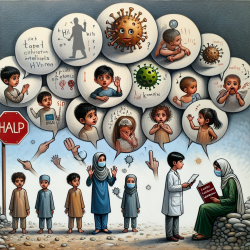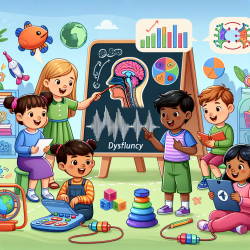The COVID-19 pandemic brought unprecedented challenges, especially for children with language delays. A recent study titled "Association between interruption of intervention and language performance in young children with language delay: a cohort study during COVID-19 pandemic" by Hsu and Wong provides valuable insights into how these interruptions affected language development in young children. Here's what practitioners can learn from this study to improve their therapeutic approaches.
The Study in a Nutshell
This study examined 33 children who experienced a three-month interruption in their language intervention programs due to the pandemic. The researchers collected data on their language performance using the Comprehensive Developmental Inventory for Infants and Toddlers-Diagnostic Test (CDIIT-DT) at four different time points. The results showed a decline in language abilities during the interruption but a significant improvement once interventions resumed.
Key Findings
- Decline During Interruption: The median scores for language comprehension and overall language ability showed a decreasing trend during the three-month interruption.
- Improvement Post-Interruption: Resuming interventions led to a statistically significant increase in all language domains.
- Vulnerability of Borderline Delay Group: Children with borderline delay (CDIIT-DT DQ scores between 71 and 85) were more likely to experience a decline during the interruption.
Practical Implications for Practitioners
Based on these findings, here are some actionable steps practitioners can take:
1. Prioritize Continuity in Therapy
Maintaining consistent intervention schedules is crucial. Even short interruptions can negatively impact language development, especially in children with borderline delays. Teletherapy options can be a valuable tool to ensure continuity.
2. Focus on Language Comprehension
The study found that language comprehension scores were more sensitive to interruptions. Techniques like Enhanced Milieu Teaching (EMT) and interactive book reading can help strengthen language comprehension, which in turn supports overall language development.
3. Tailor Post-Interruption Strategies
Post-interruption interventions should be intensified to make up for lost time. Focus on individualized plans that target the specific needs of each child to accelerate their progress.
4. Educate Parents
Parents often underestimate the importance of ongoing intervention, especially when their child shows borderline delays. Educate them on the risks of interruption and the benefits of continuous therapy.
Encouraging Further Research
While this study provides valuable insights, it also highlights the need for further research. Larger sample sizes and diverse populations can help validate these findings and develop more robust intervention strategies.
To read the original research paper, please follow this link: Association between interruption of intervention and language performance in young children with language delay: a cohort study during COVID-19 pandemic.










